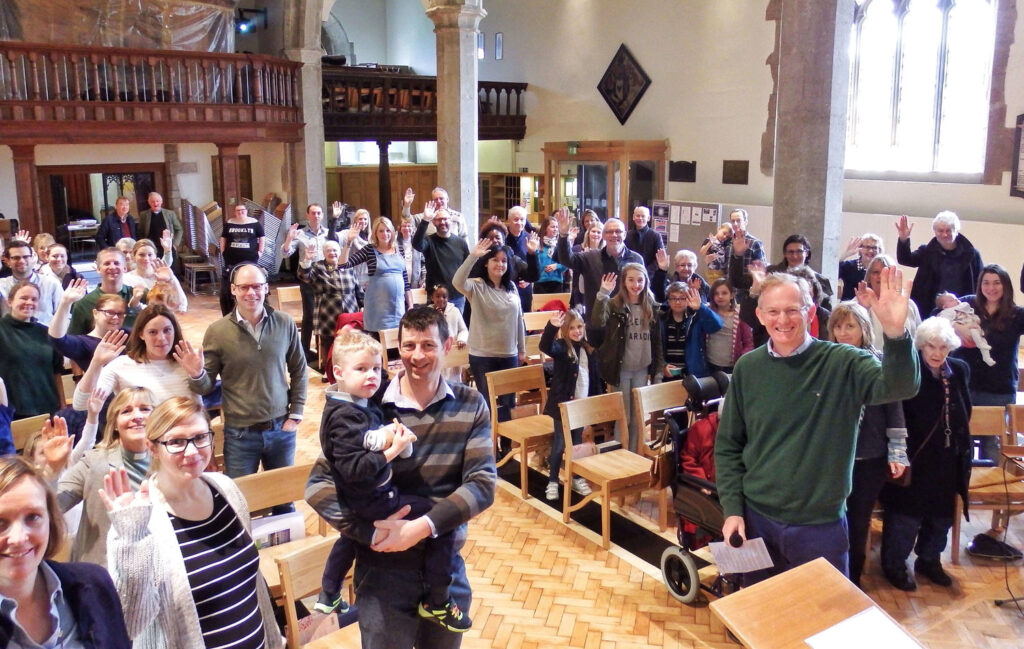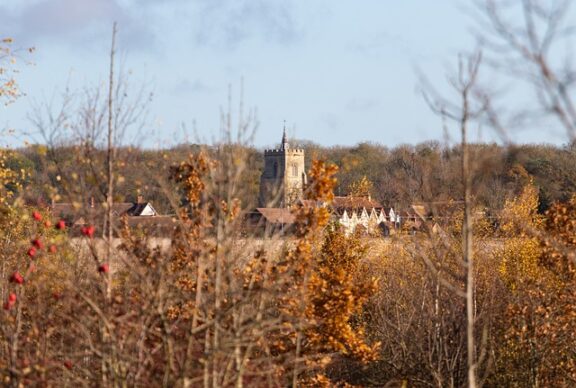Introducing the Growing Rural Parishes Programme (GRPP)
In our diocese, although 80% of our population is in urban areas, 60% of our parishes are rural. The increasing challenges of rural parish ministry are evident across the Church of England, with rural clergy being asked to take on more churches , often with fewer resources. It is clear that a more radical and more imaginative approach is needed.
In seeking to develop thriving, sustainable and generative patterns of mission and ministry, the diocese has piloted and are developing innovative ways of growing rural parishes using national church funding. The ‘Benefice of the Future’ pilot began in 2017 and is being continued with new funding as the ‘Growing Rural Parishes’ programme.
The programme works with rural church communities to develop their resources, from their leadership teams to their church buildings, to enable them to grow in prayer, make new disciples and serve the people of their communities with joy. Through seeking the vocation of each church, not replicating everything everywhere, investing in technology where it supports, adding curates and building ministry teams, and simplifying governance where it is welcomed, we are learning lessons in how we can continue to value and be committed to local communities, whilst bringing a greater sense of belonging and interdependence over larger rural areas.
The pilot programme, ‘Benefices of the Future’, involved working with four large multi-parish benefices to explore innovative models, with the long term aim to roll out some of our learning to other benefices. The benefices were spread across the Diocese and varied in size, make up and tradition. Have a look at their websites here:
- Avon Valley Churches – avp-benefice.org.uk/
- North Hampshire Downs – More to Life churches – moretolife.church/
- Pastrow Family – pastrowfamily.org.uk/
- The Bright Waters Benefice – hantswhit.church/
Each area has had the freedom to address the specific needs of their local community. This has led to a whole range of approaches to everything from new forms of worship to what a modern church website should look like. This in turn has resulted in a wider range of learning for the rest of the Diocese – see the ‘How to’ guides below created using learnings from the pilot.

Cultural Change
To move the rural church from weakness to strength and change its culture, the model begins with a step change. Rather than stretching the current rural model, we create a benefice of sufficient size to provide enough internal resource, produce efficiency of scale and permit diversity/differentiation.
Unity is strengthened by a leadership team under a distinct shared identity (enhancing internal and external consistency), simplified structures and a single point of representative governance. Simplification frees up resources. Diversity is strengthened with each church being confident of its unique contribution to the mission and life of the benefice. Not everything will be offered in every place. What is offered in each place is the best that can be offered. Each place celebrates and supports what is offered elsewhere in the benefice. Rather than finding it difficult to fill clergy and lay positions the rural church becomes a generator of these.
This is supported with ICT employed wherever possible to improve access to and engagement in the life of the Christian community and by a culture in which all benefice initiatives prioritise the ‘missing generations’, youth and children.
To help shape a culture of change we asked benefices sign up to mutually agreed principles such as
- We are not going to do everything everywhere
- We have as much to offer each other as we have to learn from each other
- Clergy may take services; laity may take services
- When something is about the needs of children and young people, adults give way
- The answer is ‘yes’, the question is ‘how?’
Prayer undergirds all we do and needs to undergird this whole process. Deliberate and explicit prayer should be worked into the plans of each benefice to surround and inform the vision and its outworking.
NEW FUNDING APPLICATION PROCESS
We are delighted that the Diocese of Winchester has recently been awarded a further £460,000 of national church funding ‘in principle’ to support our work in rural multi-parish benefices over the next five years through the Growing Rural Parishes Programme (GRPP).
As part of the GRPP, we will be making £30,000 available to each of nine multi-parish benefices to help their ministry teams to develop parish ministry of the future, allocating the funding through three annual rounds of bidding, in each case selecting three rural benefices for support. The details of the selected benefices in each round will then be submitted to the Church Commissioners for final approval.
New Funding Application Update
The first round of funding applications has now closed (with awards going to Thorngate and Blackwater, Sherfield on Loddon, and a joint award to Brightwater and Overton Benefices).
The second round of funding was awarded to the Dever Benefice, New Forest Edge and a joint bid from Bentley, Binsted & Froyle, together with Northanger Benefice.
The next round of funding is now open and the application deadline is 19 September 2025.
The application form, which includes selection criteria, the form your bid should take, and the timeline for the bidding process, can be downloaded here >>>
Everything we have done in the project has been with this aim in mind. Our rural churches are the heart of the Diocese and the purpose of the programme has been to find ways to help them become growing communities who can face the future with confidence.
How can it be done?
Here are three practical steps:
- Commit together to a vision for the next five years, which incorporates the principles listed on the page above.
- Simplify your structure and administration – this may seem a bureaucratic place to start but it is important to release time for mission.
- Share the work by developing lay leaders – this has probably been the most successful aspect of the project, with over 30 new leaders across the first three areas.
One of the ways in which the Church is changing is through the increased role being played by our lay leaders. The days are now gone when everything in the parish could be led by the clergy, and with the support of the School of Mission, the benefices which have been through the pilot have seen a huge increase in local worshippers take up vocations.
How have they done this? The first thing has been to talk about it both from the pulpit and in 1:1 discussions. Then there have been local taster days for anyone who is interested and finally flexible training programmes.
Many have trained for the Bishop’s Commission for Mission (BCM) and are now successfully taking leading roles in their churches.
See here for the full BCM programme >>>
IT connectivity is central to much of what we do as churches:
- Streamed video and music as part of worship
- Contactless giving
- The streaming of our services (especially relevant during the lockdown)
The traditional means of getting online is by having an active telephone line and then connecting it to a broadband router – this is what most of us probably have at home, and it works well. Costs are approximately £100 installation, plus between £30 and £40 per month rental. So far so good, but there is a catch – if a new line needs to be installed, this is simple with an unlisted domestic property but requires more careful consideration with historic buildings. New lines need to be attached to the outside of any building, and holes then drilled for cable access; for our grade I, II* and II listed buildings, this could cause harm to the historic fabric, so therefore justification will be required along with the oversight of a suitably trained conservation architect.
All new telephone line installations in the UK are carried out by Open Reach – regardless of broadband supplier. Every new line also requires a site survey; these are booked by your potential broadband supplier. There is normally a 2-4 week wait for the visit, and each survey costs £125 (including VAT). This is payable whether a line is then installed. For more details about Open Reach, see this link.
Overhead lines are the cheapest and easiest solution. New lines can also be run underground, but installation costs increase dramatically – often to sums of £6000-£10 000 . One workaround is if there is a non-listed hall or other building attached to the church, the cable can be attached to this and a signal booster purchased to ensure wi fi coverage in the church. These booster units cost in the region of £200. In this instance you will need to check with the DAC team to determine whether a level of permission would be required. In some areas, Virgin Telecoms have cable available in the street and can offer connections.
The situation is much simpler when there is an existing phone line, and the process can be completed in a few weeks.
So, What Can Be Done If a New Line Cannot Be Installed?
One option is plug in mobile Wi-Fi. Sometimes known as dongles, these small devices use the mobile phone network to deliver Wi-Fi, and because they are portable, have no detrimental impact on the fabric of the building. For this introduction, no faculty is necessary. Coverage can be patchy, but the MiFi units will work on any network depending on the SIM card, so churches can use whichever network is strongest in their location. Cost starts from £30 per month and rise to £32 pm (inclusive of VAT) for unlimited data. Another advantage is that you can put the unit in your pocket and use it in conjunction with a contactless payment unit anywhere in the parish for events such as fetes, fayres and collecting fees.
MiFi units are in use in 11 of the Benefice of the Future pilot churches. Most of the suppliers will provide loan units so that they can be checked in each church before any order is placed. Contracts are normally for 12 months.
Suppliers to consider include the following:
Desired Outcomes of Benefice of the Future
- Arrest the decline in numbers and within three years in the 3 initial pilot benefices bringing 15% growth in new and returning disciples with at least 60% from the missing generations, youth and children
- Generate up to 30 new BCMs and at least 4 new vocations to ordained or Licensed Lay Ministry
- Capture learning to share with other multi church rural benefices across our diocese
- Each church (building and Christians locally) finding its ‘vocation’ – what it can offer and contribute to the mission of the Church
- A shared, strong identity across the benefice with parishes rejoicing in and owning all that the Church offers across the benefice
- Excellent communication
- Benefices prepared to risk ideas, get things wrong, try and try again anew
- People coming forward to serve God in new ways and some ministry being offered/given away to other benefices
- Growing congregations with a significant increase in numbers from ‘the missing generations’, youth and children
- Simplified governance structures, freeing people from meetings to mission and ministry
- Efficiencies of scale
- New uses of technology to better serve the Church and community
- A deepening of discipleship
- A growing number of ‘fresh expressions of Church’
- The incumbent’s role increasingly be one of oversight, strategy and ministry development, with laity taking more of a leading role in mission and ministry along with other ordained ministers
- A stronger social offer/engagement from the Church, ‘serving the common good’
